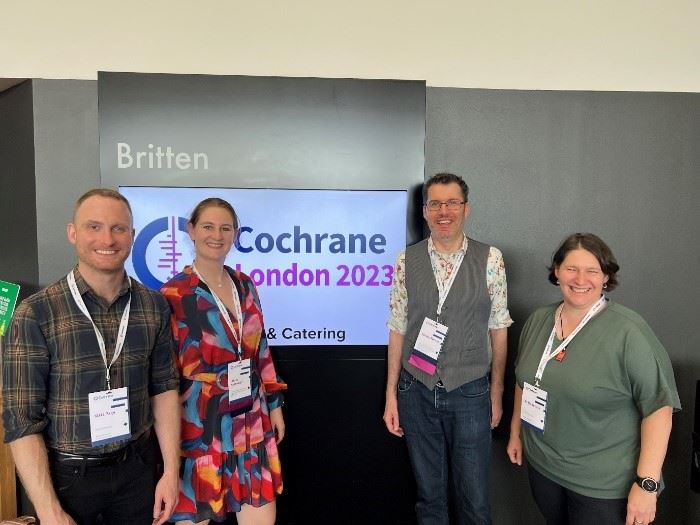This year I was the lucky recipient of the SSA & CSIRO/Data 61 Betty Allan Travel Award. I am a very grateful recipient of this award, as it supported me to attend the 30th Anniversary Cochrane Colloquium in London, where I had the opportunity to showcase my research in-person to an international audience.

Pictured left to right: Matthew Page, Lizzie Korevaar, Simon Turner, Joanne McKenzie
My area of research is in the statistical methods for evidence synthesis, primarily focusing on the meta-analysis of results from interrupted time series designs. For a researcher in evidence synthesis, the Cochrane Colloquium is the primary international forum for the dissemination of research on methods for evidence synthesis. I was able to present my work to a broad and global audience including systematic reviewers, editors, methodologists (e.g., statisticians, information specialists), stakeholders, users of reviews, policy makers, software designers. Held over a jam-packed 4 days, the Colloquium provided space for 413 presenters, over 1000 attendees to participate in a range of activities, including up to 12 parallel sessions consisting of meetings, plenaries, oral sessions, workshops, networking and social events. Needless to say, it was a very busy conference!
My contribution to the conference program included an oral presentation (a lightning quick overview of an empirical study I conducted during my PhD to compare statistical methods used to meta-analyse results from interrupted time series studies) and two workshops, one of which I lead (Introduction to analysis and meta-analysis of interrupted time series studies) and the other I co-facilitated (Advanced meta-analysis 1: Random-effects methods to be implemented in RevMan). Having completed my PhD during the pandemic, the oral presentation was my first in-person presentation in front of such a large international audience – a thrilling experience. Also, to my delight, both workshops were well attended (in fact, the room for the ITS workshop was full!) and we received excellent feedback both during and after the conference, with plenty of requests for material and interest in our future work.
So, what were the highlights?
-
This was the first time I’d developed and delivered material for a workshop. While it was a lot of work to prepare everything, it was very rewarding to have a full room of people engaged with our work and interested in hearing our expertise. It was great to feel that our research will have an impact.
-
This was also the first time I’d had the opportunity to meet many of my international collaborators, some of whom I’ve worked with for several years.
-
A conscious and continual focus of the colloquium was on the inclusion of end users in research, right from the early to late stages of the projects. I was particularly impressed with the work of Anastasia Koch who spoke during the plenary titled Building trust through co-creation: re-imagining evidence, about her development of a public engagement non-profit organisation that focuses on involving those living in TB-prevalent districts of Cape Town with education, advocacy and science communication about the disease. Again, it was really exciting to see the impact of research. For those interested, the plenaries can be found online, discussing i) Global health, equity and trust, ii) Ensuring integrity in biomedical research, and iii) Building trust through co-creation: re-imagining evidence (Koch’s talk is introduced at 31:45).
-
Of course, a major highlight of the conference was hearing from other statistical methodologists. In particular, the awardee of the Thomas C. Chalmers award for best presentation addressing methodological issues related to systematic reviews given by an early career investigator, Peter Godolphin (from UCL in the United Kingdom), gave a brilliant talk about handling aggregation bias in subgroup analyses of a meta-analysis, and accurately estimating interactions between treatment and covariate subgroups.
Lizzie Korevaar introducing the Workshop: Introduction to analysis and meta-analysis of interrupted time series studies with continuous outcomes
What next?
-
Our packed-out workshop demonstrated to us that there is a need and an appetite for guidance on analysing and meta-analysing ITS studies. This has reinvigorated my enthusiasm for my projects and I’ve enjoyed getting back into the research after the busy-ness of conference.
-
The workshops also injected new ideas into our plans for future research. Talking to attendees of our workshops, we were able to hear about the situations encountered in practice or areas that they find most difficult. I’ve also enjoyed discussing these areas since our return from the conference, and prioritising which pieces of the puzzle to study next.
-
It was also a great chance to discuss the projects already underway with current collaborators but also, importantly, to hear about and discuss possible future projects with potential new collaborators! I look forward to getting started on these!
Finally (and most profoundly), one of the major highlights of the conference was coming away with a fresh sense of hope. I often find I feel overwhelmed by the sensation that the pile of problems is constantly growing (statistical, political, health related etc), and this was enhanced during the last few (particularly difficult and isolated) years. However, I found that it was incredibly heart-warming to meet so many passionate researchers and hear of their hard work and triumphs.
Dr Lizzie Korevaar
Research fellow in the Methods for Evidence Synthesis Unit,
School of Public Health and Preventive Medicine, Monash University

Pictured left to right: Nat Strobel, Tari Turner, Miranda Cumpston, Simon Turner, Steve McDonald, Lizzie Korevaar, Jeremy Grimshaw, Sue Brennan, Joanne McKenzie
